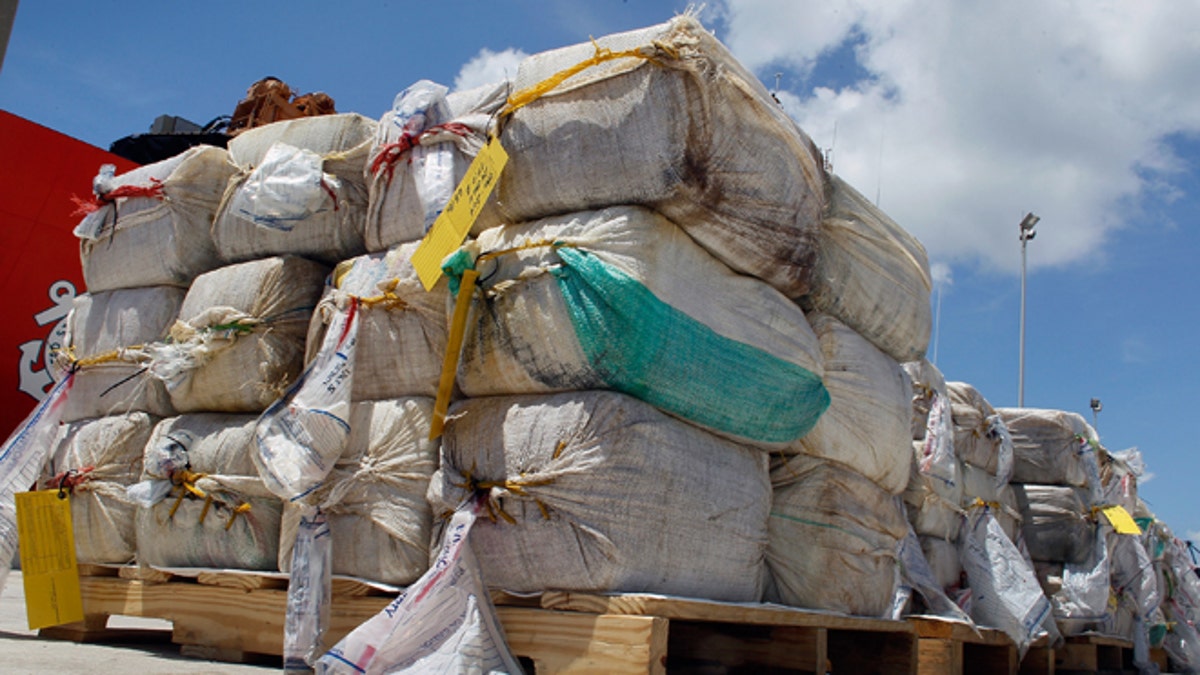
MIAMI BEACH, FL - AUGUST 02: Some of the 15,000 pounds of cocaine that U.S. Coast Guard crew members offloaded from the Cutter Oak are seen next to the ship on August 2, 2011 in Miami Beach, Florida. The cocaine worth more than $180 million was seized from a self-propelled semi-submersible vessel in the western Caribbean Sea on July 13. (Photo by Joe Raedle/Getty Images) (2011 Getty Images)
For decades, Venezuela has been overshadowed by its neighbors when it comes to drug trafficking.
Neither a major drug producing nation nor home to infamous narcotraffickers like Pablo Escobar or Joaquín "El Chapo" Guzmán, the South American nation was viewed by many as a dreary backwater in the drug trade while the real business was going on in places like Colombia, Mexico and throughout the Caribbean.
But the recent arrest of two nephews of Venezuela's first lady for conspiring to import cocaine into the United States – and news earlier this year of a major U.S. investigation into the involvement of high ranking Venezuelan officials in cocaine trafficking and money laundering – has shed light on the major role the country plays in the international drug trade.
"Venezuela is a big hub for transshipment of drugs," Eric Olson, the associated director of the Latin American program at the Woodrow Wilson Center told Fox News Latino. "Venezuela is strategically positioned to traffic drugs to the Caribbean, the U.S. and even Europe."
For decades, Venezuela has been a key throughway for traffickers moving their products between Colombia and the rest of the world. Colombian traffickers used their country's shared border with Venezuela to ferry drugs into the country and also used Venezuela as a base of operations during periods of crackdowns by Colombian officials.
There is no reason to believe that the Venezuelan government is not involved in narcotrafficking.
The DEA estimates that over 200 tons of cocaine passes through Venezuela each year, though security forces generally seize less than a quarter of that number every year. The United Nations Office on Drugs and Crime (UNODC) calculates that Venezuela ranks fourth in the world in terms of cocaine seizures. Mexican organizations like Guzmán's Sinaloa Cartel have also established cells inside Venezuela in recent years
While Venezuelan officials have been involved in the drug trade almost since its inception in the country – a major from the country’s army reserve was caught with 667 kg of cocaine in a small aircraft in 1983 – experts say government involvement began to flourish under the late President Hugo Chávez and continued under the command of current leader Nicolás Maduro.
No evidence has been made public that directly links Maduro to the drug trade, but his two nephews, Efraín Antonio Campos Flores and Francisco Flores de Freites, reportedly told the Drug Enforcement Administration that they were acting in connection with Diosdado Cabello, speaker of the National Assembly, and former Venezuelan Minister of the Interior Tareck el Aissami – both close allies of the president.
"There is no reason to believe that the Venezuelan government is not involved in narcotrafficking," Sonia Schott, the former Washington D.C. correspondent for Venezuelan news network Globovisión told FNL. "If they're not involved, why didn't they make any investigations into the drug trafficking."
Earlier this year, the Wall Street Journal published a report – citing the U.S. Justice Department – that said an investigation by federal prosecutors in New York and Miami and a DEA unit found "extensive evidence" to suggest Cabello was one of the heads of a suspected trafficking cartel involving military officers and top government officials.
And last month, judges in the southern district of Florida unsealed drug trafficking indictments against Pedro Luís Martín, a former head of financial intelligence for Venezuela's secret police, and Jesús Alfredo Itriago, a former counternarcotics official with Venezuela's investigative police.
Despite the numerous arrests and indictments, little has been done in Venezuela to stem the flow of drugs entering the country or to root out those within the government involved in trafficking. Instead, the Maduro government has fallen back on criticizing the U.S. for what it says are baseless charges from an ideological foe.
"Whenever the U.S. takes some actions against Venezuela, high-level leaders, or those closely associated with those leaders in Venezuela, the government tries to use it as an opportunity to claim they're under attack by a meddling United States," Jason Marcazk, the deputy director at Atlantic Council's Adrienne Arsht Latin America Center, told FNL.
Marczak added that with parliamentary elections coming up in December, Maduro will most likely try to use the arrests of his two nephews for his political advantage. But that will likely not work, he said, because the country’s economy is spiraling – most Venezuelans cannot afford to buy basic goods like toilet paper and shampoo – and Maduro’s approval ratings are at a record low.
"There are long-running suspicions of elite ties to the drug trade,” Marczak said. “Whether those associations are with high-ranking authorities, those in the military, there's increasingly concern by the Venezuelan people about the direction in which their country is going."
Elizabeth Llorente contributed to this report.




















